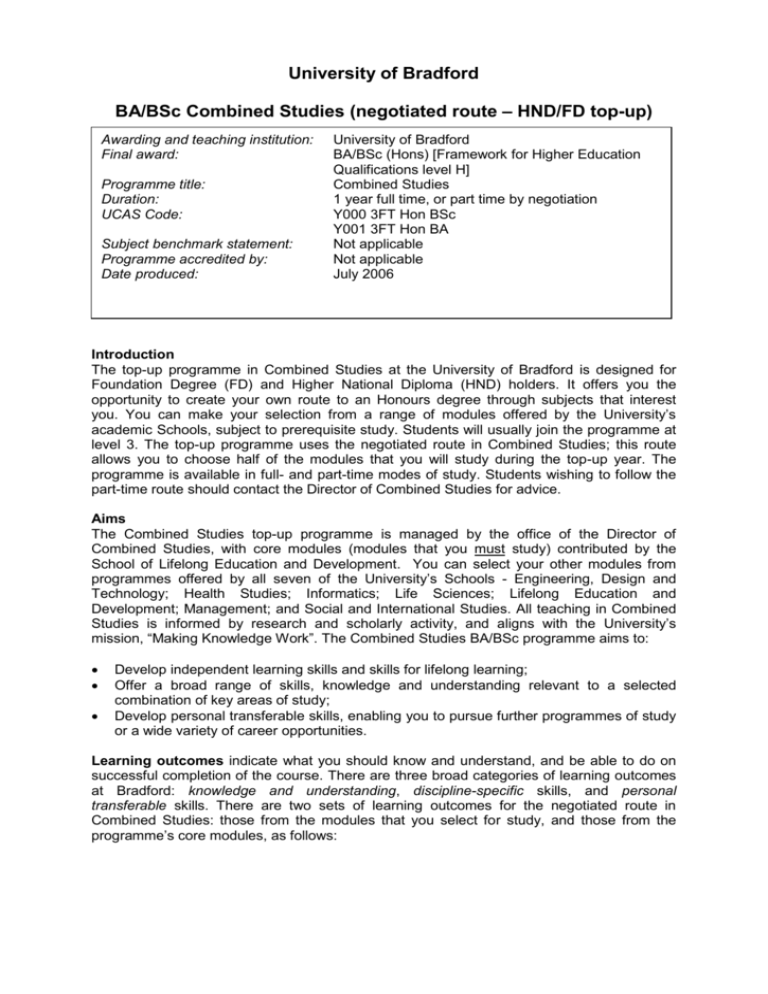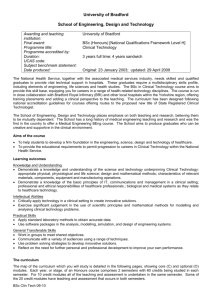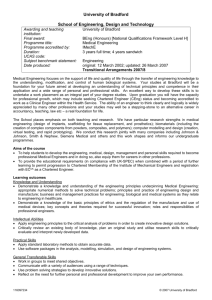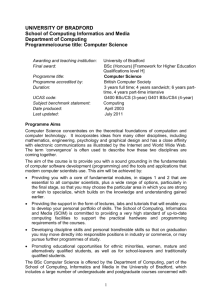BA/BSc Combined Studies (negotiated route HND
advertisement

University of Bradford BA/BSc Combined Studies (negotiated route – HND/FD top-up) Awarding and teaching institution: Final award: Programme title: Duration: UCAS Code: Subject benchmark statement: Programme accredited by: Date produced: University of Bradford BA/BSc (Hons) [Framework for Higher Education Qualifications level H] Combined Studies 1 year full time, or part time by negotiation Y000 3FT Hon BSc Y001 3FT Hon BA Not applicable Not applicable July 2006 Introduction The top-up programme in Combined Studies at the University of Bradford is designed for Foundation Degree (FD) and Higher National Diploma (HND) holders. It offers you the opportunity to create your own route to an Honours degree through subjects that interest you. You can make your selection from a range of modules offered by the University’s academic Schools, subject to prerequisite study. Students will usually join the programme at level 3. The top-up programme uses the negotiated route in Combined Studies; this route allows you to choose half of the modules that you will study during the top-up year. The programme is available in full- and part-time modes of study. Students wishing to follow the part-time route should contact the Director of Combined Studies for advice. Aims The Combined Studies top-up programme is managed by the office of the Director of Combined Studies, with core modules (modules that you must study) contributed by the School of Lifelong Education and Development. You can select your other modules from programmes offered by all seven of the University’s Schools - Engineering, Design and Technology; Health Studies; Informatics; Life Sciences; Lifelong Education and Development; Management; and Social and International Studies. All teaching in Combined Studies is informed by research and scholarly activity, and aligns with the University’s mission, “Making Knowledge Work”. The Combined Studies BA/BSc programme aims to: Develop independent learning skills and skills for lifelong learning; Offer a broad range of skills, knowledge and understanding relevant to a selected combination of key areas of study; Develop personal transferable skills, enabling you to pursue further programmes of study or a wide variety of career opportunities. Learning outcomes indicate what you should know and understand, and be able to do on successful completion of the course. There are three broad categories of learning outcomes at Bradford: knowledge and understanding, discipline-specific skills, and personal transferable skills. There are two sets of learning outcomes for the negotiated route in Combined Studies: those from the modules that you select for study, and those from the programme’s core modules, as follows: Knowledge & Understanding On successful completion of the core modules students will be able to: demonstrate a systematic understanding of the theory and practice of social research, effective research design, and a range of quantitative and qualitative research methods; demonstrate in depth knowledge of a selected issue, topic, or subject; critically analyse the relevance of theoretical and academic debates. Discipline Skills On successful completion of the core modules students will be able to: critically evaluate research processes; contextualise knowledge and understanding derived from a range of primary and secondary sources; apply a range of appropriate research methods to a given topic. Personal Transferable Skills On successful completion of the core modules, students will be able to: communicate original ideas clearly, cogently and coherently through the marshalling of evidence in written format. The learning outcomes for these awards are consistent with the Framework for Higher Education Qualifications in England, Wales, and Northern Ireland. The Curriculum The map of the core modules in your top-up year is shown on the table below. The table includes columns which show the stage, level, and credit rating of each module. Each stage of an Honours degree programme comprises modules totalling 120 credits. Full-time students normally study 60 credits in each semester. Modules worth 10 credits are delivered and assessed within one semester, whereas modules worth more than 10 credits may be delivered in one or more semesters in that year or stage. Module code LED6522D LED5014K Module title Research Methods and Mehodologies Dissertation credits 20 40 level 3 3 semester 1 1, 2 NB - You must choose additional modules amounting to 60 credits from the University’s module catalogue, subject to prerequisite study, availability, and negotiation with the Director of Combined Studies. Progression Regulations: a summary The full assessment regulations for the awards of the University are detailed and complex and are maintained on the University web-site. What follows here is a condensed version; To pass and proceed from one stage to another and to be eligible for a classified Honours award, you must achieve at least 40% in 100 credits, and 35% in the other 20 credits. The Class and Division of the undergraduate Honours Degree that you are awarded is based on the overall weighted marks that you achieve in Stage 2 and Stage 3. Stage 2 contributes 30%, and Stage 3 contributes 70%. The degree is awarded on the basis of the following overall weighted average marks: 70% and above 60% and above 50% and above otherwise First Class Honours Second Class Honours – First Division Second Class Honours – Second Division Third Class Honours If you fail to meet the progression criteria for an Honours award, but have met the criteria for an Ordinary award, you may be eligible to transfer to that award. (Details of the progression regulations can be found at http://www.brad.ac.uk/admin/acsec/QA_Hbk/Undergrad_Regs_.html#progression_between_ stages) Teaching, Learning and Assessment Strategies The Combined Studies programme will provide you with a range of teaching, learning and assessment strategies. The modules will enable you to develop a range of skills, appropriate to your subject area or individual mode of learning, which taken together will enhance your capability to function as a self-directed learner. Much of your learning will be in the form of guided study, where you will make use of various learning materials and resources, including electronic ones. Detailed and clear module documentation will enable you to prepare for participation in discussions, and will provide you with constructive steps towards becoming an independent learner. The Director of Combined Studies will act as your personal tutor throughout your studies, offering general pastoral, as well as academic, support. A special staff-student liaison meeting will take place each semester. This will provide you with a formal opportunity to discuss any programme-related concerns with teaching staff and the Director of Combined Studies. Assessment is a crucial component of your learning which is necessary to monitor your progress, motivate learning, provide feedback and grade students. Assessment methods will reflect the diversity of provision, and will directly address desired learning outcomes. There will be an opportunity for you to undertake assignments requiring the exercise of initiative in their definition, design and execution e.g. a dissertation, or project work. Admissions Policy Offers are made following detailed consideration of each individual applicant. However, you must have successfully completed an HNC or FD amounting to 240 credits to be admitted to the top-up programme. Student Guidance and Progression University and School student handbooks, the course handbook, and module descriptors will provide you with a wealth of helpful information and guidance. The support provided by the School is enhanced by a strong University infrastructure, including the Disability Office, Student Counselling Service, Library, Careers Service and 24-hour access to Computer facilities. Student support links can be found at: http://www.brad.ac.uk/internal/student.php. The Director of Combined Studies will advise you on appropriate choices of modules. For further information contact: The School of Lifelong Education and Development, University of Bradford, Bradford BD7 1DP. Call: 01274-233210. Visit: www.bradford.ac.uk/sled Email: learning@bradford.ac.uk








